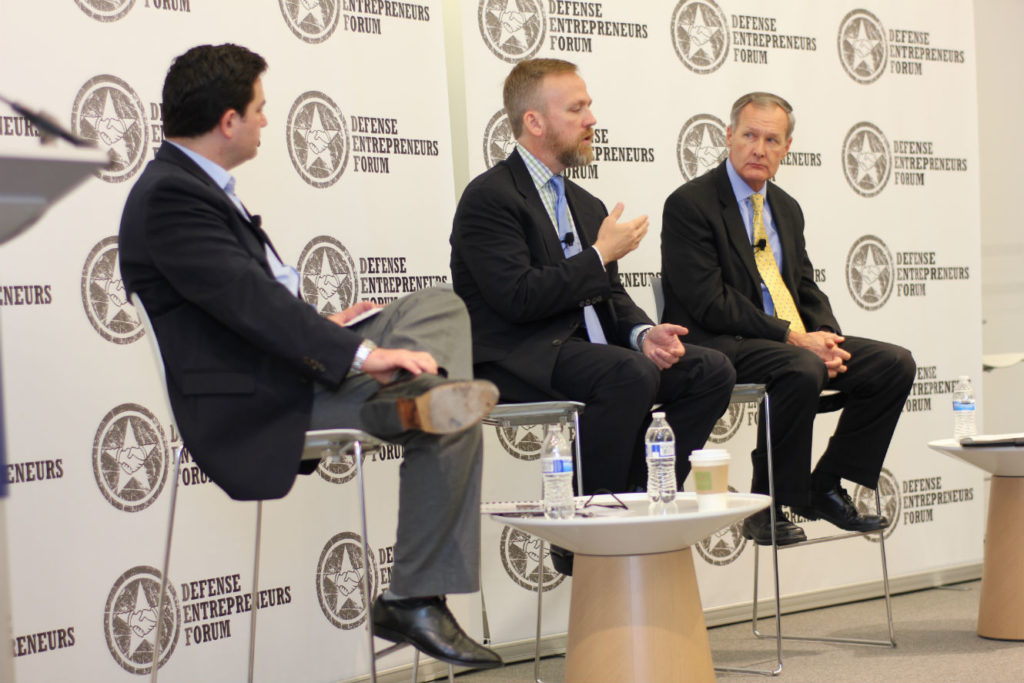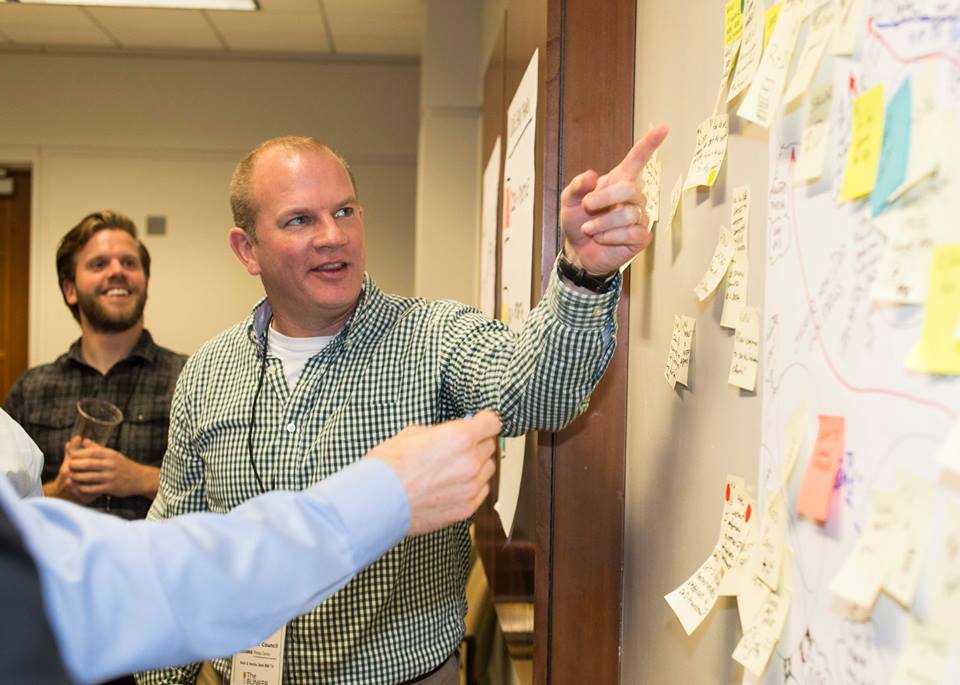Inspire, Connect, and Empower: A Network of Defense Intrapreneurs

Editor’s note: We will be doing a live Google Hangout next week with DEF leadership on July 21st at 12:30 PM Eastern. Details to follow. Mark your calendars.
“Networking, of course, is helping solve challenges in many aspects of life today. Networks of all kinds – physical, virtual, and social – have – with link after link and strand upon strand – improved how we work and govern, how we sell and shop, how we live and learn. And as the world’s businesses, governments, and other institutions become more interconnected, it’s in tune with the times that the world’s militaries would do the same.” – Secretary of Defense, Dr. Ashton Carter, June 20, 2016 at CNAS2016
With my phone in one hand, my eyes darted back and forth between its small screen and Secretary Carter’s projected image. I stood along the wall listening intently to his voice as it echoed throughout the ballroom and the marbled halls. His words resonated on a topic near and dear to my heart. Delivering the keynote address at the Center for a New American Security’s annual conference, Carter emphasized the strategic value of strong networks in 21st century security. Connecting via Twitter and #Slack, countless other listeners and I were able to connect in real-time and embody the sort of network that he was describing.
In today’s interconnected world, our military must leverage the power of networks to defeat and deter the networked threats that we face such as non-state actors and violent extremist groups. While Carter pointed out many new networks that have come together in the last few years to address new and complex challenges in Europe, the Middle East, Asia, and here at home, he left out the one network that is actually a deviation from the status quo (and designed to combat a persistent internal enemy). The Defense Entrepreneurs Forum (DEF) is a rapidly growing grassroots network of emerging defense leaders who are passionate about improving the defense enterprise from within.
In contrast to the $72 billion that the Defense department will invest in research and development next year – more than double Apple, Google, and Intel combined – DEF is innovating from within and doing it all for free. Moreover, in a world where “no one group or person controls creating change, but most people at the Pentagon have the power to stop it” (as Ben Fitzgerald pointed out right before Carter took the stage), we need a network that is both innovative and resilient. DEF’s loose network of “intrapreneurs” is well-suited to succeed because it is, as best-selling author Ori Brafman described at DEFx William & Mary, “a starfish within a spider.” Unlike spiders (and hierarchical networks like the military) which die when you cut off the head, decentralized starfish networks have no central control system. When the entrenched interests try to combat change, the network becomes more de-centralized and grows stronger.
The Lean Startup Network
In true startup fashion, the founding team launched their minimum viable product in 2013. Four years ago, the concept of a three-day “unconference” was a gamble. Today, it is an example of what is possible. The inaugural event catalyzed a grass-roots movement by junior leaders to exceed the constraints of their rank and duty position.
Participants came to Chicago to do more than just listen. In addition to passion, the array of junior- and mid-grade military professionals, veterans, and civilian entrepreneurs each brought something unique to offer. Over the weekend, they shared their own ideas and solutions while strengthening, reshaping, and expanding their networks exponentially. By connecting disparate ideas and networks, the creative friction and discovery activities yield novel insights and this is the core of the innovation engine that DEF created.

DEF events center on participants, not speakers. The first DEF annual conference combined the best parts of TEDx pitches, Startup Weekend hack-a-thons, and the relaxed, free-flowing dynamic of happy hours. It was a rudimentary prototype that would be refined over the next few years.
Scaling an Innovation Network
For the last three years, the annual 3-day conference at the University of Chicago’s Booth School of Management has brought together 125 participants ranging from flag officers, to junior and mid-career leaders and civilians. DEF events mix plenary speakers, discovery activities, team problem solving events, and case studies. The intensity of this melting pot of ideas has consistently and easily achieved the simple goals of promoting cross-pollination of ideas and innovative thinking. More notably, DEF has contributed to solving complex problems in various ways, most notably with our 70-page contribution to the Force of the Future known as the F5 Report. Collectively, these actions have expanded the community and reinforced a culture of forward-leaning open-mindedness.
The energy from the annual 3-day conferences spawned regional 1-day events (dubbed DEFx) and local networks (called DEF Agoras) with monthly events that are all reshaping the role of junior leaders in the defense community. The satellite events have occurred wherever networks chose to host them. The first was in Annapolis, Maryland in 2014 and was led by a network of Naval Academy midshipmen. Meanwhile, others have occurred in Washington DC, Kansas City, Norfolk, Texas, Fort Benning, Quantico, and San Diego. The schedule for 2016 is still growing with events in Silicon Valley and Australia scheduled for later this year (and growing interest for Boston, Philadelphia, and Seattle events).
The Agoras, from the ancient Greek for “an open place of assembly”, are the new communities of practice within our profession. Filling the void of officer and NCO clubs, they offer a place for senior and junior leaders to engage each other and break down the silos that stifle innovation – to cut out the middlemen who would otherwise have the power to stop good ideas from taking hold.
The State of the Network
Since 2012, DEF has firmly established itself as an innovation engine within the defense enterprise. Today, DEF is an independent, 501(c)(3), not-for-profit group of emerging defense intrapreneurs striving to solve national security problems from the bottom-up by exposing defense professionals to the techniques and experiences of civilian innovators and social entrepreneurs.
Intrapreneurship is the act of behaving like an entrepreneur while working within a large organization, and it flies in the face of our top-down bureaucracy. Moreover, while there are many people (including many of our own members) who are sounding the alarm that the Pentagon is losing the war for talent, many of us are still serving and are dedicated to improving from within. This may all sound a bit quixotic and that is perhaps part of the unique culture that DEF embodies – if disrupting entrenched interests were easy, everyone would be doing it.
As innovators and intrapreneurs, DEF is driving change, but DEF is not the “office of good ideas.” A hierarchical solution like that would not survive a head-on fight in the mammoth bureaucracy. Instead, DEF is a loose network that exists to inspire, connect, and empower emerging leaders to have out-sized impact through innovation.
By attracting diverse, passionate, and open-minded individuals, the energy of DEF events inspires participants to exceed the bounds of their current position, to take on problems, and to think differently about the status quo. The DEF network connects participants from disparate parts of the defense enterprise at conferences and happy hours and through virtual platforms. Connecting innovative thinkers and incomplete ideas creates the discovery that leads to change. Through a variety of methods — from idea generation to senior-leader engagement — the DEF network empowers junior leaders to be change agents in the national security sector.
Outcomes, Not Just Outputs
Without a doubt, DEF has given an outlet to Defense professionals who seek personal growth, challenges, and impact. In the four years since its inception, DEF has empowered leaders all over the country to lead change and to disrupt the military’s cultural status quo. The true impact, however, is even broader – not just talk, but action and output. Each annual conference has included an innovation pitch competition that has given emerging leaders the opportunity to showcase their ideas in front of senior leaders. Last year’s winners included an automated flight scheduling program, the ICARUS pilot visor system, and the Unified Mask Concept. Not every idea is a success, but they all are examples of what is possible when you combine an idea and some work.
Is the DEF Network for You?
After three years, DEF has proven there is untapped potential energy and talent within the DoD, while firmly establishing itself as an honest broker of ideas and a reputable resource for senior leaders. The future of the DEF network is to become an even stronger catalyst and more robust incubator for young innovators and projects, a better resource for senior leaders, and an organization that harnesses the expertise and potential energy of a diverse professional community.
We believe the complexity of national security necessitates defense professionals with innovative solutions. We believe that great ideas do not depend on rank and that creative problem solving cannot be developed rapidly. Today’s junior and mid-grade defense professionals will be the future military leadership of this country. The DEF network exists to offer these young professionals the opportunity to learn, to have an out-sized impact, and to disrupt the status-quo within the defense enterprise. The connections that weave across DEF’s network will help its members throughout their careers to innovate on specific problems they face and to change the climate of the military over time to embrace and foster future innovation.
- We believe in disruptive thinking and the need to connect disparate parts of the network.
- We believe that creativity and freedom should not end simply because we are under garrison’s bureaucracy.
- We believe that no rank has a monopoly on good ideas.
- We believe in the value of pairing digital communities with in-person gatherings.
- We believe that innovation and wildly simple ideas can start anywhere.
- We believe that investing in people always has a positive return.
- And we believe that we should not have to wait for a top-down solution or ask for approval to improve our professional community.
If you share our impassioned belief in people, networks, and ideas, then join us. Join a local Agora, submit your idea for the innovation competition, participate in (or host) a local DEFx event, or join us for DEF2016 in Chicago on October 7-9th. 21st century security will require networks, and in particular, it will require more disruptive thinkers like you.
Jim Perkins is the executive director of the Defense Entrepreneurs Forum and an active duty Army officer. He holds an M.B.A. from Georgetown University and a B.S. from the United States Military Academy. He is the founder of MilitaryMentors.org and an active member of the Military Writers Guild. He lives in Washington, DC with his wife and son. He tweets at @jim_perkins1. The views expressed here are the authors own and do not represent the U.S. Army or the Department of Defense.

